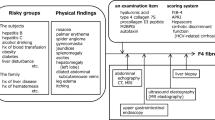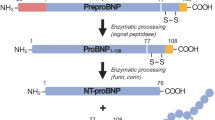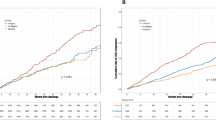Abstract
Objective
To reveal the underlying relationships between Chinese medicine (CM) syndromes and ultrafiltration (UF) in the treatment of heart failure based on a metabonomic approach.
Methods
Seventeen acute decompensated heart failure (ADHF) patients were enrolled, and their CM syndromes before and after UF were collected. In addition, their venous plasma collected before and after UF was used for liquid chromatographmass spectrometer-based metabonomic analysis. Both reversed phase liquid chromatography and hydrophilic interaction liquid chromatography were used to analyze the plasma samples. Partial least-squares to latent structure-discriminant analyses were used for data analysis.
Results
An obvious difference was observed pre- and post-treatment. A total of 17 potential biomarkers associating with alterd syndromes with UF including hypoxanthine, 1-methylhistidine, phytosphingosine, O-decanoyl-R-carnitine, etc. were screened out, showing a significant change after UF. The major adjusted metabolic pathways were purine metabolism, histidine metabolism, leucine and isoleucine metabolism, arginine and proline metabolism, carnitine shuttle, sphingolipid metabolism and phospholipid metabolism.
Conclusions
Metabonomic approach is a useful tool to identify potential biomarkers of altered syndromes link to UF and could provide a theoretical basis for further research on the therapeutic mechanism of UF combined with CM.
Similar content being viewed by others
References
Marenzi G, Muratori M, Cosentino ER, Rinaldi ER, Donghi V, Milazzo V, et al. Continuous ultrafiltration for congestive heart failure: the CUORE trial. J Card Fail 2014;20:9–17.
Ambrosy AP, Pang PS, Sadiya K, Konstam MA, Fonarow GC, Brian T, et al. Clinical course and predictive value of congestion during hospitalization in patients admitted for worsening signs and symptoms of heart failure with reduced ejection fraction: findings from the EVEREST trial. Eur Heart J 2013;34:835–843.
Felker GM, O’Connor CM, Braunwald E. Loop diuretics in acute decompensated heart failure necessary? Evil? A necessary evil? Circ Heart Fail 2009;2:56.
Krum H, Cameron P. Diuretics in the treatment of heart failure: mainstay of therapy or potential hazard? J Card Fail 2006;12:333–335.
Dong Y, Ma XC, Feng XQ. The treatment of ultrafiltration to the diuretic resistance in patients with refractory heart failure and the influence of pattern of syndrome distribution. Chin Circ J (Chin) 2014;29 (Supple):194.
Jiang TT, Li JC. Review on the systems biology research of yin-deficiency-heat syndrome in traditional Chinese medicine. Anat Re (Hoboken) 2020.期? 页码?
Nicholson JK, Wilson ID. Opinion: understanding ‘global’ systems biology: metabonomics and the continuum of metabolism. Nat Rev Drug Discov 2003;2:668–676.
Jian Z, Hui ZY. 2014 China Guidelines for the diagnosis and management of heart failure. Chin J Cardiol (Chin) 2014;42:98–122.
Zheng XY, ed. Guiding principles for clinical research on new drugs of traditional Chinese medicine. Beijing: China Medical Science Press; 2002:79–80.
Bart BA, Goldsmith SR, Lee KL, Redfield MM, Felker GM, O’Connor CM, et al. Cardiorenal rescue study in acute decompensated heart failure: rationale and design of CARRESS-HF, for the Heart Failure Clinical Research Network. J Card Fail 2012;18:176–182.
Kinugawa T, Ogino K, Kato M, Kato T, Osaki S, Endo A, et al. Altered purine and glycogen metabolism in skeletal muscle during exercise in patients with heart failure. Metabolism 1999;48:484–488.
Bauer JA, Moffatt-Bruce SD, Elton TS, Feldman D. Purine metabolism in heart failure: oxidant biology and therapeutic indications. Congest Heart Fail 2008;14:283–284.
Gao K, Zhao H, Gao J, Wen B, Jia C, Wang Z, et al. Mechanism of Chinese medicine herbs effects on chronic heart failure based on metabolic profiling. Front Pharmacol 2017;8:864.
Yu Y, Yang S, Mao LG, Liu CM, Chen J, Hu YT, et al. Identification of potential metabolic biomarkers in yin deficiency syndrome using LC-MS. Anat Record 2020;303:2121–2130.
Huang X, Chen Q, Yang G, Dai W, Lang Q, Du J, et al. Metabolic profiling study of yang deficiency syndrome in hepatocellular carcinoma by H1 NMR and pattern recognition. Evid-Based Compl Alt 2012;2012:1–6.
Lu X, Xiong Z, Li J, Zheng S, Huo T, Li F. Metabonomic study on ‘Kidney-yang deficiency syndrome’ and intervention effects of Rhizoma Drynariae extracts in rats using ultra performance liquid chromatography coupled with mass spectrometry. Talanta 2011;83:700–708.
Tain YL, Hsu CN. Toxic dimethylarginines: asymmetric dimethylarginine (ADMA) and symmetric dimethylarginine (SDMA). Toxins (Basel) 2017;9:92.
Potočnjak I, Radulović B, Degoricija V, Trbušić M, Pregartner G, Berghold A, et al. Serum concentrations of asymmetric and symmetric dimethylarginine are associated with mortality in acute heart failure patients. Int J Cardiol 2018;261:109–113.
Ruiz M, Labarthe F, Fortier A, Bouchard B, Thompson LJ, Bolduc V, et al. Circulating acylcarnitine profile in human heart failure: a surrogate of fatty acid metabolic dysregulation in mitochondria and beyond. Am J Physiol Heart Circ Physiol 2017;313:H768–H781.
Ahmad T, Kelly JP, Mcgarrah RW, Hellkamp AS, Fiuzat M, Testani JM, et al. Prognostic implications of long-chain acylcarnitines in heart failure and reversibility with mechanical circulatory support. J Am Coll Cardiol 2016;67:291–299.
Müller OJ, Heckmann MB, Ding L, Rapti K, Rangrez AY, Gerken T, et al. Comprehensive plasma and tissue profiling reveals systemic metabolic alterations in cardiac hypertrophy and failure. Cardiovasc Res 2019;115:1296–1305.
Lopaschuk GD, Ussher JR. Evolving concepts of myocardial energy metabolism: more than just fats and carbohydrates. Circ Res 2016;119:1173–1176.
Chen Y, Chen CX. Advances in energy metabolism in the pathogenesis and treatment of heart failure. Chin Tradit Patent Med (Chin) 2014;36:1272–1276.
Gan L, Jiang TT, Yi WJ, Lu R, Xu FY, Liu CM, et al. Study on potential biomarkers of energy metabolism-related to early-stage yin-deficiency-heat syndrome based on metabolomics and transcriptomics. Anat Record 2020;303:2109–2120.
Stenemo M, Ganna A, Salihovic S, Nowak C, Sundström J, Giedraitis V, et al. The metabolites urobilin and sphingomyelin (30:1) are associated with incident heart failure in the general population. ESC Heart Failure 2019;6:764–773.
Marcinkiewicz-Siemion M, Ciborowski M, Ptaszynska-Kopczynska K, Szpakowicz A, Lisowska A, Jasiewicz M, et al. LC-MS-based serum fingerprinting reveals significant dysregulation of phospholipids in chronic heart failure. J Pharm Biomed Anal 2018;154:354–363.
Acknowledgements
We are grateful to all the participants and staffs in the trial.
Author information
Authors and Affiliations
Contributions
Guo LJ and Sun MQ performed the entire experiment and wrote the manuscript. Ma XC contributed to the conceptualization and design of the experiment. Chen KJ made the comments on the experiments and manuscript. Gao F, Wang AZ, and Zheng Y contributed to the sample collection and experiment preparation.
Corresponding author
Additional information
Conflicts of Interest
The authors claim no potential conflicts of interest relevant to this article.
Supported by the National Natural Science Foundation of China (No. 81273932)
Rights and permissions
About this article
Cite this article
Guo, Lj., Chen, Kj., Sun, Mq. et al. Metabonomics: A Useful Tool to Reveal Underlying Relationships between Altered Chinese Medicine Syndromes and Ultrafiltration in Treatment of Heart Failure. Chin. J. Integr. Med. 27, 259–264 (2021). https://doi.org/10.1007/s11655-020-3479-7
Accepted:
Published:
Issue Date:
DOI: https://doi.org/10.1007/s11655-020-3479-7




